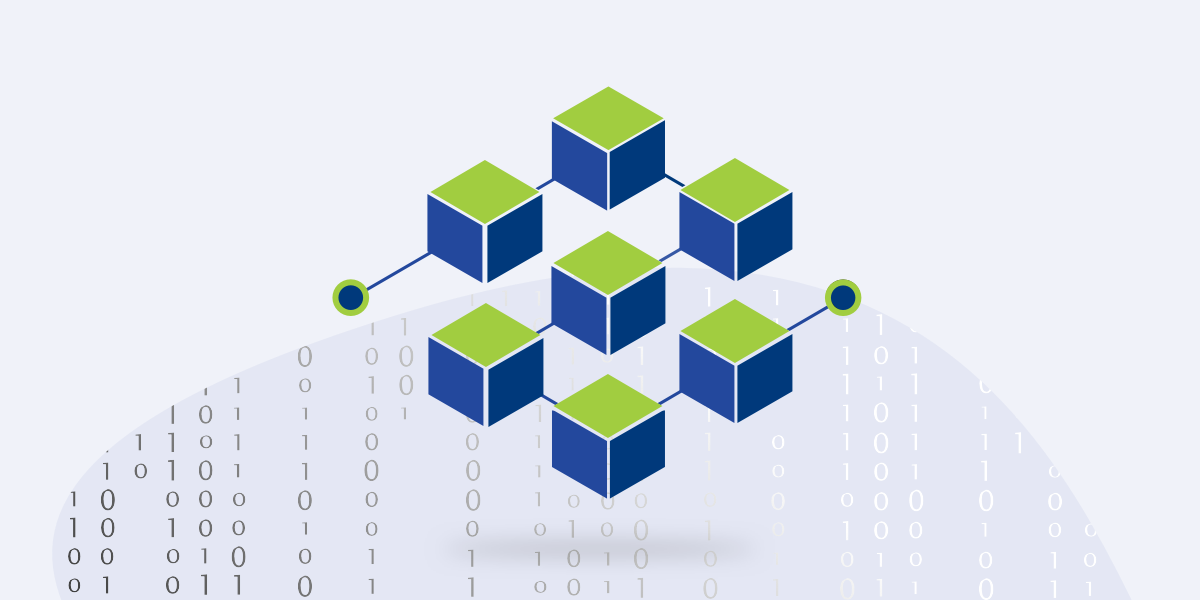A blockchain is a disassociated digital register that records transactions on thousands of computers all over the world. These are saved in a way that prevents them from being changed later. Blockchain technology improves the security and speed of information exchange in a cost-effective and transparent manner. It also eliminates the need for third parties whose primary function was to include a level of confidence and certification in transactions (e.g., notaries and banks).
The increasing significance of blockchain has captured the interest of businesses from a variety of industries, with the banking sector being the most involved at this time. The ability of blockchain to record, store, and transfer any type of asset with great ease, automation, and in a disassociated manner has caught the attention of start-ups and the financial services industry as a whole, who are visualizing potential use cases and applications in a variety of fields. The global market for blockchain technology is projected to reach $30.7 billion by the year 2027, a clear testament to its popularity and increasing use.
A professional blockchain developer with extensive expertise in cryptocurrency, data science, and serverless computing can help you maximize the advantages of blockchain, irrespective of if you require a prototype or a production-ready platform. The developer will assess possible blockchains for your projects, such as Ethereum, Hyperledger, EOS, NEO, Tezos, and Qtum, and select the best match, such as when private permission blockchains like Quorum are appropriate.
Critical skills to look for in a blockchain developer
A solid grounding in creating blockchain-based projects
It goes without saying that developers having pertinent work experience will manage your project better and faster than beginners in the industry. Be sure to review the repertoire of previous projects.
At least three years of experience in programming
Go, Rust, Python, C#, Java, C++, and Ruby are some of the programming languages to look for.
Competition in the market has skyrocketed to such a level that if your developer takes time to understand a particular technology before starting work on it, you may quite possibly lose the first-mover advantage by the time the project is ready.
Cryptography
Cryptography is the study of protocols that aid in the prevention of unauthorized access to your data. There are multiple cryptography blockchain essentials for developers that are needed during development. For example, public-key cryptography is an important aspect of blockchain since it is the foundation for all cryptocurrency transactions. Cryptographic hashing is another significant term in cryptography for blockchain.
Smart Contracts
In the blockchain industry, smart contracts are a common concept, and almost every blockchain solution makes use of them. They allow two parties to trade goods or services without the need for a third party to act as an intermediary. Smart contracts may be used in a variety of sectors, including manufacturing, law, and so on. This demonstrates how important it is for a blockchain developer to be well-versed in the technology.
Data Structures
A blockchain developer would need a thorough understanding of data structures; they deal with a variety of data structures on a daily basis and need these to create and execute networks. Moreover, the blockchain network as a whole is made up of data structures.
Blockchain Architecture
It is important to be familiar with blockchain architecture. In addition, the developer should understand what a blockchain ledger is, what consensus is, and how smart contracts operate. The three main kinds of blockchain architecture are consortium architecture, private architecture, and public architecture.
What other skills should a blockchain developer possess?
At the core, a blockchain developer is a professional who encompasses the skills of an architect, system administrator, mathematician, analyst, and financier. They should also be goal-oriented, diligent, persistent, and be able to utilize agile techniques.
It should be obvious by now that vetting and hiring an appropriate blockchain developer for your specialized project can be a time-consuming process that can last several months till the project’s end. Hiring an expert blockchain developer can be expensive, especially if you are a small business or a startup.
But what if I told you there was a way to cut the cost of your project while also gaining additional benefits, including improved productivity, a stronger emphasis on business, and access to a diverse set of skills? You may be wondering how that is possible. The simple answer: by hiring a remote blockchain developer. But why would that be the case? The points below should give you an improved understanding of why hiring a remote developer may be a good idea:
Principal costs of utilizing an in-house blockchain developer
Remuneration
Usually, the biggest cost factor in the equation is the salary of a blockchain developer. Apropos global human resource consulting firm Robert Half International, the average salary of an in-house blockchain developer in 2021 is over $173,000 per annum (that comes to over $14,000 per month).
Office rent and related costs
Keep in mind the costs of renting office space as well as utilities such as cooling, heating, electricity, and gas when hiring in-house developers.
Specialized Tools
To hire an in-house developer, you will need specialized computer hardware as well as development software, which are not cheap.
Recruitment process costs and time
Hiring full-time resources for a specific project may not be cost-effective or even prudent in every situation. Hiring full-time employees is also a time-consuming and labor-intensive process that involves a number of steps, such as application solicitation, CV review, and personnel interviews.
Cost optimization through remote hiring
Hiring Cost of a Remote Blockchain Developer
Recall the usual mid-range remuneration of an in-house blockchain developer. Now compare that to the cost of a dedicated remote blockchain developer hired via Aspired, and it can possibly be as low as $3,000 per month.
Only pay for services that have been contracted out.
When you hire an in-house development team, you must pay each member of the team. In the case of remote developers, however, you only have to pay for the services you have outsourced.
Increased Access
Businesses are not required to rely solely on local resources. By leveraging the power of remote offshore hiring, they can gain access to thousands of options to meet their needs.
There is no requirement for training.
Training your in-house developers in the latest technologies and tools can save you a lot of money. A remote employee is not required to participate in any type of training program. Projects are delegated to people who are already experts in their fields.
When you add up all of these cost savings, you are looking at a substantial reduction in the cost of your project!
Way forward to cost-effectively utilize blockchain
With the intricacy and popularity of blockchain driving developer salaries through the roof, a remote blockchain developer would cost a fraction of the expenditure required for an in-house employee. By streamlining the hiring process of a remote blockchain developer, companies like Aspired can help you manage your project on the lower end of the cost spectrum without compromising on quality. Such a partnership would assist in making the development of your blockchain-based project smooth and error-free.

 Clients
Clients
 Processes
Processes
 Blog
Blog










